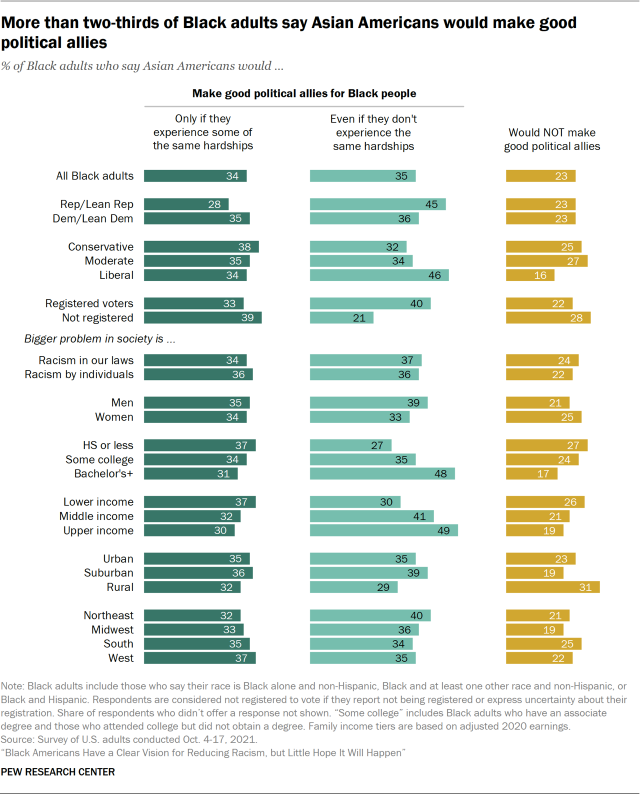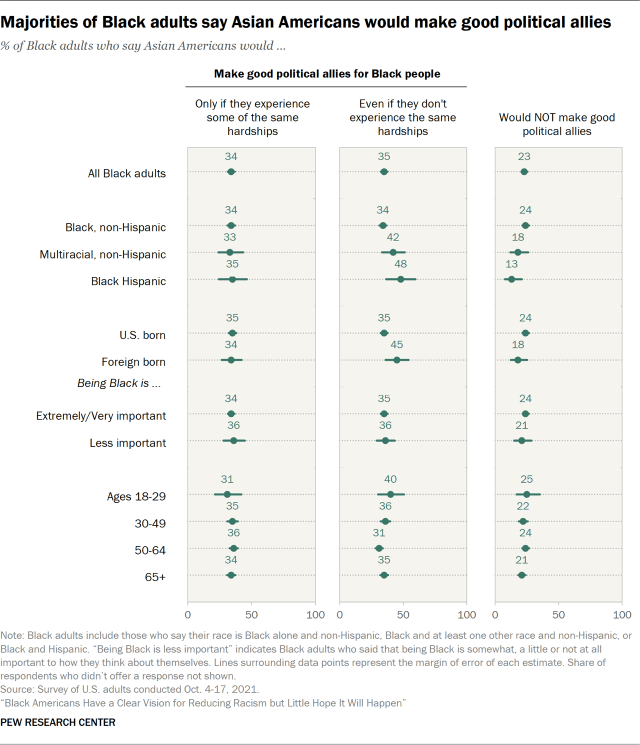Protests for racial equality emerged throughout the nation in 2020 in response to George Floyd’s murder. The subsequent racial reckoning led to public condemnations of systemic racism by politicians, corporations and organizations. Similar to the 1960s civil rights movement, the events of 2020 captured the nation’s attention, with Americans from all backgrounds joining Black Americans in the fight for racial equality. While many leaders used these events to encourage Black Americans to vote their way to racial equality, others argued that many of the nation’s institutions were beyond reform and needed to be rebuilt in order to be truly equitable.
Given the wide variety of possible political strategies to pursue racial equality, the October 2021 survey asked Black adults to rate the effectiveness of strategies such as protesting, voting, contacting elected officials and supporting Black businesses. The survey also sought to understand how Black adults see Black leaders and organizations and to determine if race matters when it comes to political allyship.
Overall, Black adults overwhelmingly say voting is the most effective strategy for helping Black people move toward equality in the United States, but the survey reveals there is support for other strategies, too. When it comes to individual leaders and organizations, Black Americans rank former President Barack Obama as the most important Black leader in the U.S. today. And in comparison with other organizations or entities, a plurality says Black Lives Matter has done the most to help Black people in recent years.
Black adults see voting as the most effective strategy for moving toward equality in the U.S.
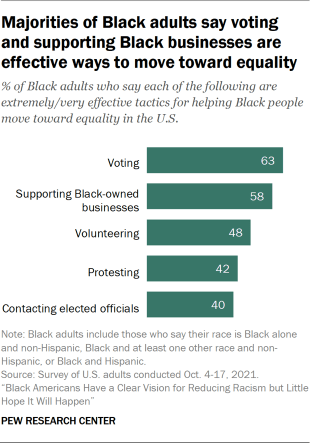
In the national survey, Black adults were asked how effective voting, protesting, contacting elected officials, volunteering with organizations dedicated to Black equality, and supporting Black businesses (“buying Black”) are as strategies for helping Black people move toward equality in the United States.
Out of the five tactics, Black adults were most likely to say voting is extremely or very effective for helping Black people move toward equality in the U.S. Even so, significant shares indicated the other strategies can also be effective.
Although most Black adults see voting as the most effective strategy for helping Black people move forward, there are notable differences across demographic subgroups of the Black population.
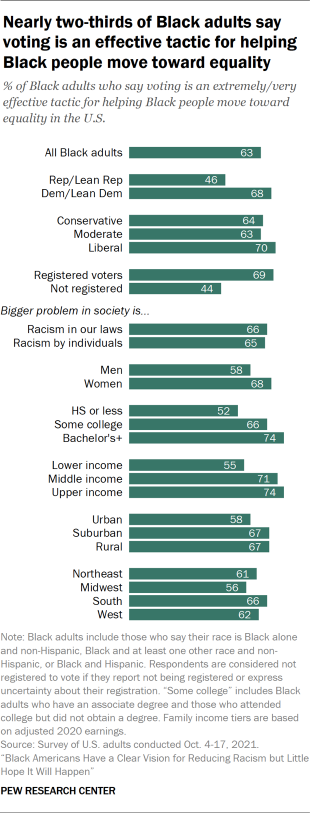
Black Democrats and those who lean toward the Democratic Party (68%) are more likely than Black Republicans and Republican leaners (46%) to say voting is an extremely or very effective tactic for helping Black people move toward equality in the U.S. Notably, nearly one-third (31%) of Black Republicans say voting is either a little or not at all effective for helping Black people move toward equality in the U.S., while just 10% of Black Democrats say the same.
Seven-in-ten Black adults who describe their political views as liberal say voting is extremely or very effective for Black equality. This share decreases to roughly six-in-ten among those who identify as moderate (63%) or conservative (64%). And Black registered voters (69%) are significantly more likely than those who are not registered to vote (44%) to say this.
Nearly seven-in-ten Black women (68%) say voting is extremely or very effective for Black equality, compared with fewer than six-in-ten (58%) Black men. When it comes to education, Black adults with at least a bachelor’s degree (74%) are more likely to say this than those with some college education but no bachelor’s degree (66%) or those with a high school diploma or less (52%). Roughly three-quarters of Black adults with upper (74%) and middle incomes (71%) say voting is extremely or very effective for helping Black people move toward equality in the U.S. By comparison, roughly half (55%) of Black adults with lower incomes say the same.
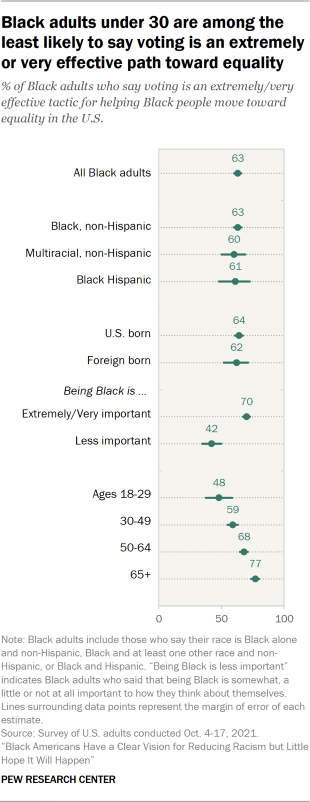
There are no differences by ethnicity when it comes to the share of Black adults who say voting is an extremely or very effective tactic. Similar shares of non-Hispanic Black adults (63%), Black multiracial adults (60%) and Black Hispanic adults (61%) say this.
However, when accounting for the importance of their racial identity, Black adults who say being Black is extremely or very important to them are significantly more likely than those for whom being Black is less important (70% vs. 42%) to say voting is extremely or very effective for helping Black people move toward equality in the U.S.
Black adults under 30 are among the least likely age group to say this. While about half (48%) of Black adults under 30 say voting is an extremely or very effective tactic, this share increases to 59% among those ages 30 to 49, 68% among those 50 to 64 and 77% among those 65 and older.
Instead, roughly one-quarter (23%) of Black adults ages 18 to 29 say voting is either a little or not at all effective, and this share decreases to about one-in-eight among those ages 30 to 49 and 50 to 64 (13% each); only 7% of Black adults 65 and older say the same.
Black adults see other forms of civic engagement as less effective than voting for achieving Black equality
Compared with voting as a strategy, fewer Black adults see supporting Black businesses (58%), volunteering (48%), protesting (42%) and contacting elected officials (40%) as extremely or very effective for helping Black people move toward equality in the U.S.
Black Democrats are more likely than Black Republicans to say each of these strategies is extremely or very effective for moving Black people toward equality in the U.S. For example, Black Democrats (63%) are more likely than Black Republicans (41%) to say supporting Black businesses is an extremely or very effective tactic. And while roughly half (52%) of Black Democrats say volunteering with organizations is extremely or very effective, only about three-in-ten Black Republicans say the same (29%). Gaps between Black Democrats and Black Republicans are narrower when it comes to the perceived effectiveness of protesting and contacting elected officials.
While more than half of Black liberals (57%) say volunteering with organizations is an extremely or very effective tactic, smaller shares of moderates (45%) and conservatives (53%) say the same. This is also true when it comes to the perceived effectiveness of protesting. Black liberals (57%) are more likely than moderates (41%) or conservatives (37%) to say protesting is extremely or very effective for helping Black people move toward equality in the U.S.
Likewise, Black registered voters are more likely than those who are not registered to vote to say each of these measures is an extremely or very effective strategy for helping Black people move toward equality in the U.S. About six-in-ten (62%) of registered voters say supporting Black businesses is an extremely or very effective tactic, compared with about half (47%) of Black adults who are not registered to vote. And while roughly half (51%) of Black registered voters say volunteering is an extremely or very effective strategy for Black equality, 37% of Black adults who are not registered say this.
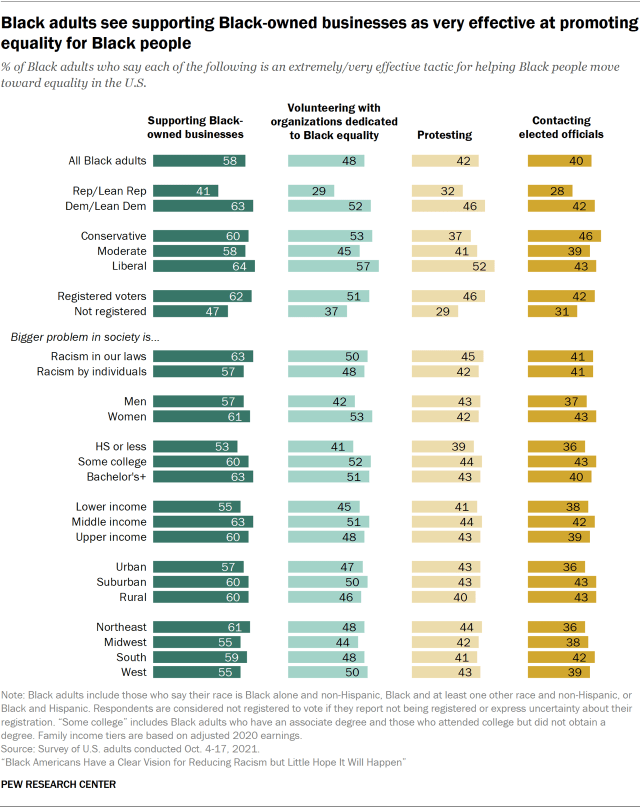
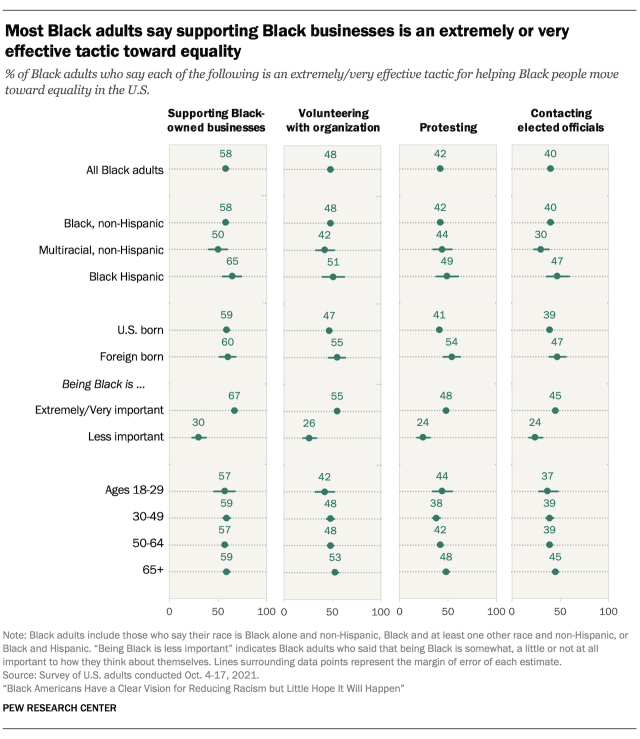
Views on which tactics are effective at helping Black people move toward equality in the U.S. do not vary significantly across Black ethnic groups. Nearly six-in-ten non-Hispanic Black adults (58%) see buying from Black businesses as an extremely or very effective strategy for helping Black people move toward equality. By comparison, half of Black multiracial non-Hispanic adults say this, as do 65% of Black Hispanic adults. Likewise, nearly half of non-Hispanic Black adults (48%) say volunteering is an extremely or very effective strategy, compared with 42% of Black multiracial adults and 51% of Black Hispanic adults.
Black adults who say being Black is extremely or very important to them are more likely than those for whom being Black is less important to say each of these measures is extremely or very effective for helping Black people move toward equality in the U.S. For example, Black adults who say being Black is important to them (67%) are more likely than those for whom being Black is less important (30%) to say buying Black is an effective strategy for moving Black people toward equality. Likewise, Black adults who say being Black is important to them (55%) are more likely than those for whom being Black is less important (26%) to view volunteering as an extremely or very effective strategy.
Similar shares of Black adults born in the U.S. and those born abroad say these strategies are extremely or very effective. The only significant difference is in the perceived effectiveness of protesting. U.S.-born Black adults are less likely (41%) than Black adults born abroad (54%) to say protesting is an extremely or very effective strategy for achieving Black equality.
While nearly half (45%) of Black adults 65 and older say contacting elected officials is an extremely or very effective tactic, smaller shares of Black adults ages 30 to 49 (39%), 50 to 64 (39%) and 18 to 29 (37%) say the same. Instead, roughly three-in-ten Black adults ages 18 to 29 (30%), 30 to 49 (26%) and 50 to 64 (28%) say contacting elected officials is only a little or not at all effective, compared with 19% of Black adults 65 and older who say the same.
Some Black adults see Black businesses and communities as effective remedies for inequality
Black adults were also asked how effective the following hypothetical strategies would be for helping Black people move toward equality in the United States: Black people owning all businesses in Black neighborhoods (39%), establishing a national Black political party (31%), and all elected officials governing Black neighborhoods being Black (27%).While fewer than half of Black adults say these strategies are likely to be extremely or very effective, the strategies are not written off entirely, with few Black adults saying these strategies would not be effective at all.
As with other issues, opinions among Black adults vary across demographic subgroups.
Black adults by party affiliation
Larger shares of Black Democrats than Black Republicans say these strategies would be extremely or very effective for helping Black people move toward equality in the U.S., though fewer than half of both groups say this. For example, roughly four-in-ten Black Democrats (42%) say having all businesses owned by Black people in Black neighborhoods would be extremely or very effective at helping Black people move toward equality. By comparison, roughly one-third (34%) of Black Republicans say the same. Instead, 42% of Black Republicans say this strategy would be a little or not at all effective, compared with roughly one-quarter (26%) of Black Democrats.
And while three-in-ten Black Democrats say having Black elected officials governing Black neighborhoods would be extremely or very effective, this share drops to roughly two-in-ten (21%) among Black Republicans.
Notably, similar shares of Black Democrats (33%) and Black Republicans (32%) say establishing a national Black political party would be extremely or very effective for helping Black people move toward equality.
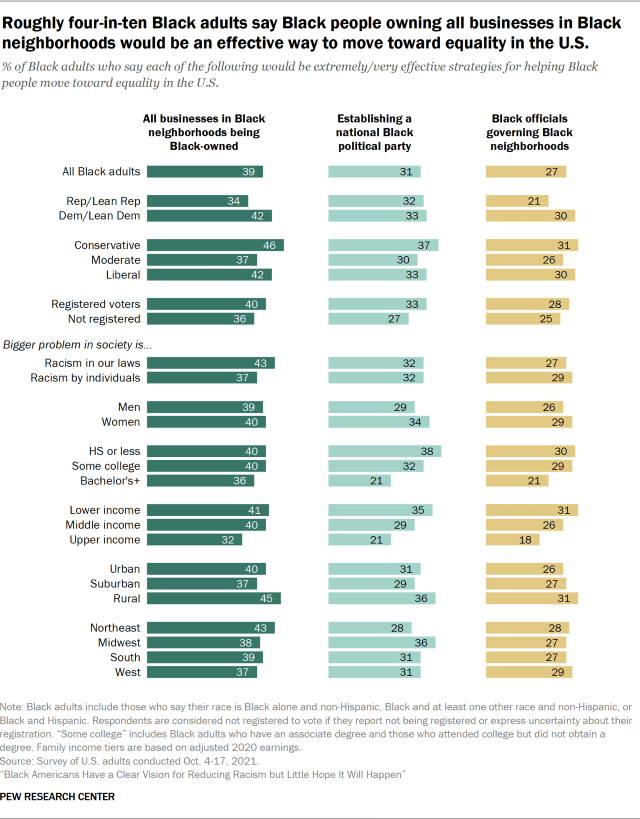
Black adults by political ideology
When it comes to political ideology, slightly higher shares of Black conservatives than Black moderates or liberals say these strategies would be extremely or very effective. Nearly half (46%) of Black conservatives say having all businesses in Black neighborhoods be Black owned would be extremely or very effective for helping Black people move toward equality in the U.S. By comparison, roughly four-in-ten Black moderates (37%) and Black liberals (42%) say the same. Likewise, while nearly four-in-ten Black conservatives (37%) say establishing a national Black political party would be extremely or very effective, roughly three-in-ten moderates (30%) and liberals (33%) say the same.
Black adults by educational attainment
Across levels of formal education, similar shares of Black adults say having only Black-owned businesses in Black neighborhoods would be extremely or very effective at helping Black people move toward equality in the country. However, Black adults with at least a bachelor’s degree are least likely to say establishing a national Black political party would be an extremely or very effective tactic. While roughly two-in-ten college graduates say this (21%), roughly one-third of those with some college education but no bachelor’s degree (32%) and nearly four-in-ten Black adults with a high school diploma or less (38%) say the same. Instead, nearly six-in-ten college graduates (55%) say this strategy would be a little or not at all effective, compared with about four-in-ten Black adults with some college but no bachelor’s degree (37%) and fewer than one-third (29%) of Black adults with a high school education or less.
Black adults with at least a bachelor’s degree are also less likely to say all elected officials governing Black neighborhoods being Black would be extremely or very effective at helping Black people move toward equality. While roughly three-in-ten Black adults with a high school education or less (30%) and those with some college but no bachelor’s degree (29%) say this, just 21% of Black adults with at least a bachelor’s degree say the same. By contrast, nearly half (47%) of Black college graduates say this strategy would be a little or not at all effective, compared with 37% of those with some college but no bachelor’s degree and 28% of those with a high school education or less.
Black adults by income tiers
A similar pattern exists across income groups as well. Black adults with upper incomes (32%) are also less likely than Black adults with middle incomes (40%) or lower incomes (41%) to say Black people owning all businesses in Black neighborhoods would be extremely or very effective for helping Black people move toward equality.
When it comes to the potential efficacy of establishing a national Black political party, Black adults with lower incomes (35%) are more likely than those with middle (29%) or upper incomes (21%) to say establishing a national Black political party would be an extremely or very effective strategy. By contrast, Black adults with upper incomes are the most likely income group to say establishing a national Black political party would not be effective, with 56% saying so. The share drops to less than half (46%) among Black adults with middle incomes and 29% among Black adults with lower incomes.
Black adults with upper incomes (18%) are also less likely than those with middle (26%) or lower incomes (31%) to say having Black elected officials govern Black neighborhoods would be an extremely or very effective tactic for helping Black people move toward equality. At the same time, nearly half of Black adults with upper incomes (49%) say this would be a little or not at all effective, compared with 43% of those with middle incomes and 29% of those with lower incomes.
Black adults by ethnicity
When it comes to ethnicity, four-in-ten non-Hispanic Black adults say Black people owning all businesses in Black neighborhoods would be an extremely or very effective tactic for achieving Black equality in the U.S. By comparison, roughly one-third (34%) of Black multiracial adults and some 38% of Black Hispanic adults hold the same view.
There are also no significant differences by ethnicity when it comes to the perceived effectiveness of establishing a national Black political party. Nearly three-in-ten non-Hispanic Black adults (32%), Black multiracial adults (25%) and Black Hispanic adults (26%) say establishing a national political party would be extremely or very effective.
Black adults who say being Black is extremely or very important to how they view themselves are more likely than Black adults for whom being Black is less important to view each of these strategies as being extremely or very effective for helping Black people move toward equality. For example, nearly half (46%) of Black adults who say being Black is extremely or very important to them also say Black people owing all businesses in Black neighborhoods would be an extremely or very effective strategy. By comparison, just 17% of Black adults for whom being Black is less important hold the same view.
Likewise, Black adults who say being Black is very or extremely important to their identity (36%) are also more likely than Black adults for whom being Black is less important (14%) to say establishing a national Black political party would be extremely or very effective for helping Black people move toward equality in the U.S. Additionally, Black adults who say being Black is very or extremely important to how they view themselves (32%) are more likely than Black adults for whom being Black is less important (12%) to say having all elected officials governing Black neighborhoods be Black would be an effective strategy.
Black adults by age groups
Roughly four-in-ten Black adults ages 18 to 29 (40%), 30 to 49 (44%) and 50 to 64 (39%) say Black people owning all businesses in Black neighborhoods would be an extremely or very effective strategy for helping Black people move toward equality in the U.S. By comparison, three-in-ten Black adults 65 and older agree. Instead, Black adults 65 and older are most likely to say this strategy would be a little or not at all effective (37%), compared with 30% among Black adults ages 50 to 64 and nearly one-quarter of Black adults 18 to 29 and 30 to 49 (24% each).
Roughly one-third of Black adults ages 18 to 29 (33%), 30 to 49 (34%) and 50 to 64 (31%) say establishing a national Black political party would be extremely or very effective, while about one-quarter (24%) of Black adults 65 and older agree. Instead, Black adults 65 and older are most likely to say this would be little or not at all effective (47%), compared with 41% of Black adults ages 50 to 64 and roughly one-third of Black adults ages 18 to 29 (36%) and 30 to 49 (33%).
Finally, younger Black adults ages 18 to 29 (32%), 30 to 49 (32%) and 50 to 64 (23%) are more likely than Black adults 65 and older (18%) to say having Black elected officials govern Black neighborhoods would be an extremely or very effective way for helping Black people move toward equality in the country. By contrast, Black adults 65 and older (48%) are most likely to say this would be little or not at all effective, compared with 41% of those 50 to 64, 34% of those 30 to 49 and 25% of those ages 18 to 29.
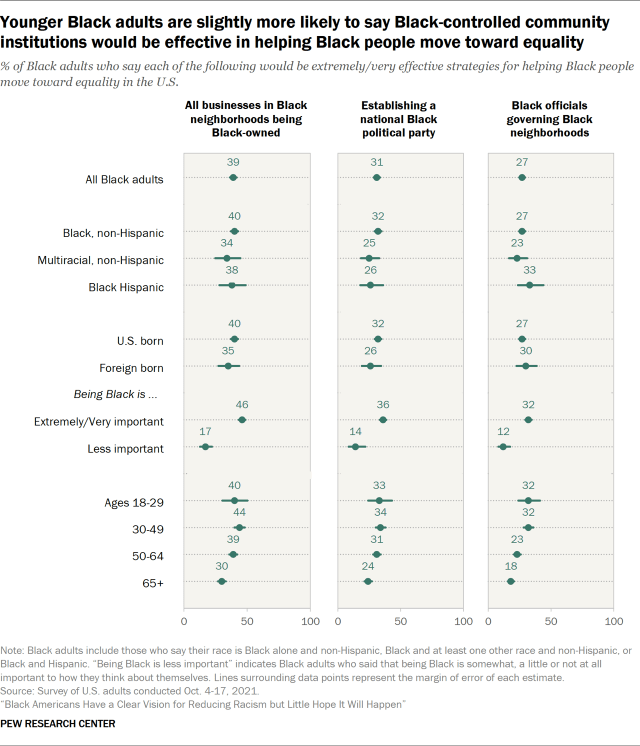
Obama ranked as the most important Black leader in the U.S. today
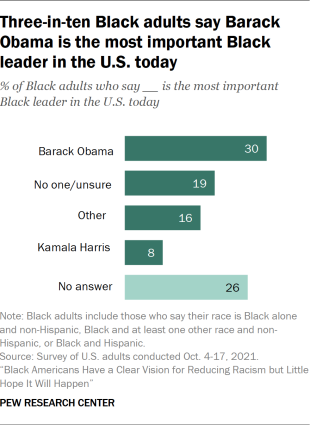
When asked in an open-ended question to name the most important Black leader in the U.S. today, three-in-ten Black adults wrote in former President Barack Obama. Current Vice President Kamala Harris ranked second for most mentions, with 8% naming her. Another 19% of Black adults say there is no Black leader in the U.S. today or indicated they weren’t sure, while 16% named someone else.
The pattern of responses varies little by demographic subgroups with exception to partisanship and political ideology. Roughly one-third (35%) of Black Democrats cited Obama as the nation’s most important Black leader, compared with one-in-six Black Republicans (16%). Black Republicans (33%) were more likely than Black Democrats (18%) to say they were unsure who the most important Black leader is in the U.S. today. Across ideological groups, Black liberals were most likely to pick Obama (40%) as the most important Black leader in the U.S. today, compared with 30% of Black moderates and 23% of Black conservatives.
Black Lives Matter seen as the most helpful organization for Black people in America in recent years
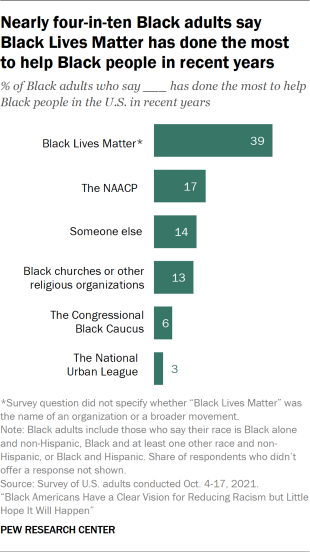
When asked to pick which of the following organizations or entities has done the most to help Black people in the U.S. in recent years, nearly four-in-ten Black adults (39%) say it is Black Lives Matter. Smaller shares chose the NAACP (17%), Black churches or other religious organizations (13%), the Congressional Black Caucus (6%) and the National Urban League (3%). Across all demographic subgroups, Black Lives Matter ranks highest as the organization that has done the most to help Black people in recent years.
Black Democrats are more likely (44%) than Black Republicans (26%) to say Black Lives Matter has done the most to help Black people in recent years. Pluralities across the ideological spectrum point to Black Lives Matter, with nearly half (47%) of Black liberals, roughly four-in-ten Black moderates (41%) and roughly three-in-ten Black conservatives (32%) doing so. Higher shares of Black registered voters (42%) than of Black adults not registered to vote (33%) agree that Black Lives Matter has done the most for Black people in the U.S. in recent years.
Black adults with at least a college degree (44%) are more likely than Black adults with some college education but no bachelor’s degree or Black adults with a high school diploma or less (37% each) to say Black Lives Matter has done the most. Across income groups, similar shares of Black adults with lower (40%), middle (40%) and upper incomes (42%) agree that Black Lives Matter has done the most.
Similar shares of Black adults across ethnicities also say Black Lives Matter has done the most to help Black people in the U.S. in recent years. Roughly four-in-ten non-Hispanic Black adults (39%), Black multiracial non-Hispanic adults (41%) and Black Hispanic adults (37%) say this. Likewise, roughly four-in-ten Black adults across age groups say Black Lives Matter has done the most in recent years.
Black Americans say race matters little when choosing political allies
The majority of Black adults say White, Latino and Asian Americans would make good political allies for Black people. However, opinions vary across Black demographic subgroups and by whether or not these racial groups need to experience the same hardships that Black Americans face to be good allies. Nevertheless, few Black adults overall say either of these groups would not make good political allies.
White people as political allies
Roughly three-quarters (77%) of Black adults say White people would make good political allies for Black people, with about four-in-ten (42%) saying this is true only if White people experience the same hardships as Black people. Roughly one-third (35%) say White people would make good political allies even if they don’t experience the same hardships. About one-in-five Black adults (18%) say White people would not make good political allies.
Although similar shares of both groups say White people would make good political allies, Black Democrats (44%) are more likely than Black Republicans (32%) to say this is true only if White people experience some of the hardships Black people face. At the same time, 43% of Black Republicans and 35% of Black Democrats say White people would make good political allies even if they don’t experience the same hardships Black people face.
Roughly eight-in-ten Black liberals (84%) say White people would make good political allies, with 42% saying this applies only if White people experience the same hardships and another 42% saying experiencing these hardships is not necessary. However, the views of Black moderates and Black conservatives are more aligned, with similar shares of both groups saying white people can be good political allies whether they experience the same hardships or not.
Nearly nine-in-ten Black adults with a bachelor’s degree or higher (86%) say White people would make good political allies, with roughly four-in-ten (37%) saying so only if White people experience the same hardships and nearly half (49%) saying this applies even if they don’t.
While the majority of Black adults with less education still agree White people would make good political allies, roughly four-in-ten Black adults with either some college education but no bachelor’s degree or with a high school education or less (44% each) say White people would make good political allies only if they experience some of the hardships Black people face. Likewise, roughly three-in-ten Black adults with some college but no bachelor’s degree (32%) and a high school education or less (27%) say White people would make good political allies even if they don’t experience the same hardships.
Black adults with upper incomes (89%) are most likely to say White people would make good political allies whether or not they experience the same hardships as Black people. Smaller but still significant majorities of Black adults with middle (79%) and lower incomes (74%) also say this.
Majorities across ethnic groups say White people would make good political allies, but higher shares of Black multiracial adults and Black Hispanic adults (83% each) say this than non-Hispanic Black adults (76%).
Roughly eight-in-ten Black adults born in the U.S. (77%) and those born abroad (82%) say White people would make good political allies for Black people. However, Black immigrants are more likely than U.S.-born Black adults to say White people would be good political allies even if they don’t experience the same hardships (46% vs. 34%).

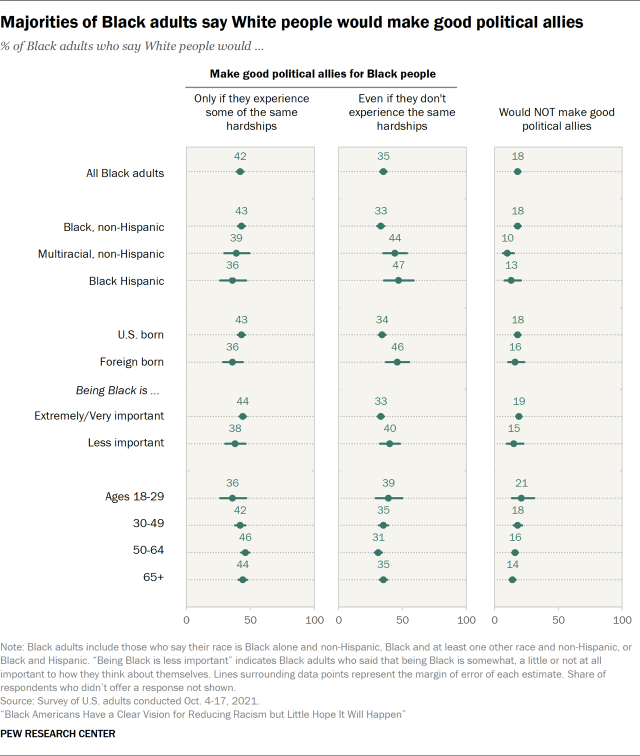
Latinos as political allies
Roughly three-quarters (77%) of Black adults say Latinos would make good political allies whether or not they experience the same hardships that Black people face.
Black liberals (87%) are more likely than Black moderates and Black conservatives (76% each) to say Latinos would make good political allies whether or not the experience the same hardships as Black people. In fact, nearly half (48%) of Black liberals say Latinos would make good political allies even without sharing the same experiences as Black people, while smaller shares of Black moderates (39%) and Black conservatives (35%) say the same.
Majorities of Black adults across education levels say Latinos would make good political allies for Black people, but Black adults with at least a bachelor’s degree (86%) are more likely than those with some college education but no bachelor’s degree (77%) and a high school education or less (70%) to say this. More than half (54%) of Black adults with a college degree say experiencing the same hardships does not matter, while smaller shares of those with some college but no bachelor’s degree (40%) and a high school education or less (30%) say the same.
Likewise, Black adults with upper incomes are most likely (87%) to say Latinos would make good political allies regardless of whether they experience the same hardships that Black people face. By comparison, 79% of Black adults with middle incomes and 74% with lower incomes say the same. While about half (53%) of Black adults with upper incomes say it doesn’t matter if Latinos experience the same hardships, smaller shares of those with middle (45%) and lower incomes (35%) say this.
Three-quarters (75%) of non-Hispanic Black adults say Latinos would make good political allies whether or not they experience the same hardships as Black people. By comparison, 81% of Black multiracial non-Hispanic adults and 92% of Black Hispanic adults say this. While nearly half of Black multiracial non-Hispanic adults and Black Hispanic adults (49% each) say it doesn’t matter if Latinos experience the same hardships, roughly four-in-ten non-Hispanic Black adults say the same (39%).
Roughly eight-in-ten Black immigrants (82%) and Black adults born in the U.S. (77%) say Latinos would make good political allies. While U.S.-born Black adults are evenly divided over whether Latinos need to experience the same hardships (38%) or not (39%), Black immigrants are less divided, with roughly one-third (34%) saying Latinos need to experience the same hardships and nearly half (49%) saying shared hardships do not matter when it comes to political allyship.
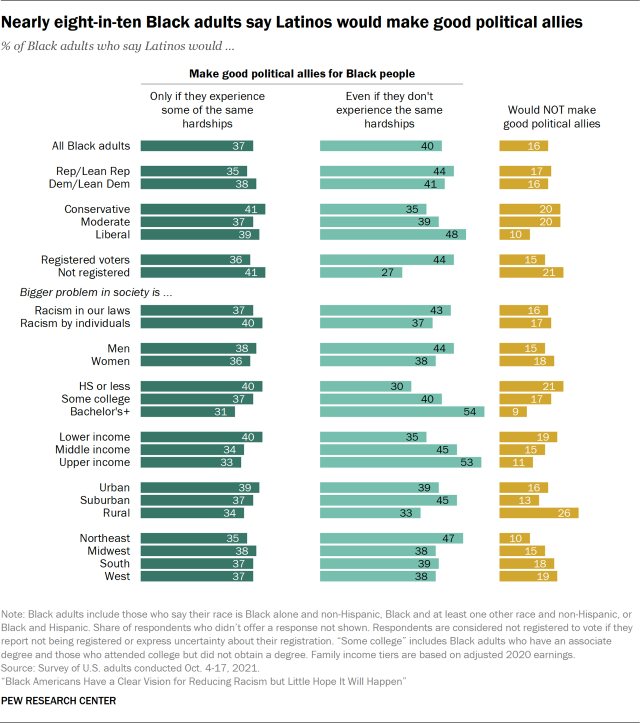
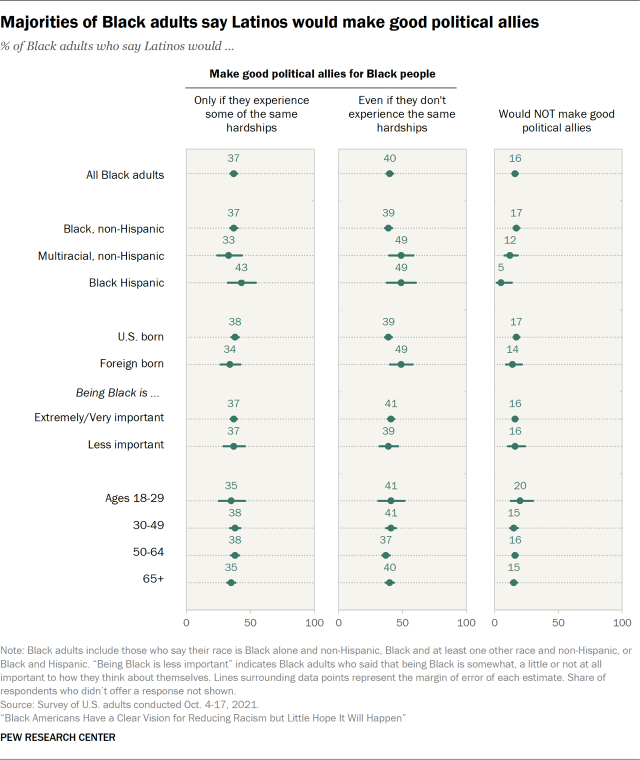
Asian Americans as political allies
Seven-in-ten Black adults say Asian Americans would make good political allies, with roughly one-third (34%) saying this is true only if Asian Americans experience some of the hardships that Black people face and another one-third (35%) saying Asian Americans would make good political allies even if they do not experience the same hardships. Roughly one-quarter (23%) of Black adults say Asian Americans would not make good political allies for Black people.
Similar shares of Black Republicans (73%) and Black Democrats (72%) say Asian Americans would make good political allies whether or not they experience the same hardships that Black people face. However, Black Republicans (45%) are more likely than Black Democrats (36%) to say Asian Americans would make good political allies even if they don’t experience the same hardships.
Black liberals (80%) are more likely than Black moderates (69%) and conservatives (70%) to say Asian Americans would make good political allies. Roughly half (46%) of Black liberals say Asian Americans would make good political allies even if they don’t experience the same hardships that Black people face. By comparison, roughly one-third of Black moderates (34%) and Black conservatives (32%) say the same.
Majorities across education levels say Asian Americans would make good political allies for Black people, but Black adults with at least a bachelor’s degree (79%) are more likely than those with some college education but no bachelor’s degree (69%) and high school or less (64%) to say this. Nearly half (48%) of Black adults with a college degree say experiencing the same hardships is not required for political allyship, while smaller shares of those with some college but no bachelor’s degree (35%) and a high school education or less (27%) say the same.
Likewise, Black adults with upper incomes are among the most likely (79%) to say Asian Americans would make good political allies regardless if they experience the same hardships that Black people face. By comparison, 73% of Black adults with middle incomes and 67% with lower incomes say this. While roughly half (49%) of Black adults with upper incomes say it doesn’t matter for political allyship if Asian Americans experience the same hardships, smaller shares of those with middle (41%) and lower incomes (30%) say the same.
Roughly two-thirds (69%) of non-Hispanic Black adults say Asian Americans would make good political allies regardless of whether they experience the same hardships Black people face. By comparison, three-quarters of Black multiracial non-Hispanic adults and roughly eight-in-ten (83%) Black Hispanic adults say the same. While nearly half (48%) of Black Hispanic adults say it doesn’t matter if Asian Americans experience the same hardships, this share drops to 42% among Black multiracial non-Hispanic adults and 34% among non-Hispanic Black adults.
Nearly eight-in-ten Black immigrants (79%) say Asian Americans would make good political allies, compared with seven-in-ten Black adults born in the U.S. While Black adults born in the U.S. are evenly divided over whether Asian Americans must experience the same hardships (35%) or not (35%). Meanwhile, 34% of Black immigrants say Asian Americans must experience the same hardships, and nearly half (45%) say shared hardships don’t matter.
